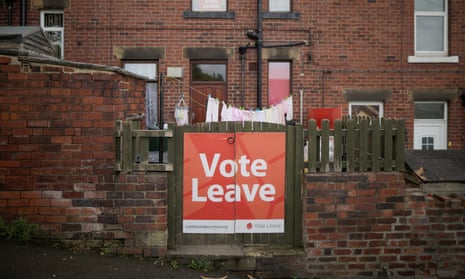The £4.3bn contributed by EU migrants to the UK economy should be earmarked in a special fund for disadvantaged communities, an influential thinktank has suggested, a plan which could form part of a “remain and reform” offer in a future referendum.
The report by Global Future, backed by Labour MPs including Yvette Cooper and Lisa Nandy, suggests the fund could be paid for by the Treasury by reversing planned cuts to corporation tax.
The multi-billion pound fund could then be used to address poor infrastructure, skills training and connectivity in areas that often have the greatest concerns about EU migration – which may have prompted significant leave votes.
Its director, Peter Starkings, said the fund would address the problems of inequality that had prompted the Brexit vote but which leaving the EU would not solve.
“Leavers voted for Brexit because they felt that Britain wasn’t working for them,” he said. “Remainers need to take that seriously and produce a plan for real reform if they are going to change any minds. We believe the migration dividend fund could be central to that agenda – and our proposals are backed by the public, including two thirds of leavers and 70% of remainers.”
The report suggests the cash should be locally managed and administered, with the government’s role being limited to coordinating and evaluating the scheme, and that funding should be guaranteed for at least 10 years, meaning at least £120m per area over a decade.
Labour’s Pat McFadden, the MP for Wolverhampton South East, who wrote the foreword to the report, said the funding should be aimed at those who did not feel like the economic benefits of migrants’ contributions were reaching them.
“Whilst some areas thrive and prosper, riding the wave of global change, others have felt the sharp end of globalisation and lost out from a long arc of economic restructuring,” McFadden said.
“Immigration brings a significant net economic benefit to the UK. Yet pointing out net economic benefits means little to people if they see few opportunities around them and the place in which they live feels neglected.”
Nandy, the Labour MP for Wigan, said: “Towns have rightly welcomed many migrants over recent years through asylum accommodation and EU migration. It has brought huge benefits, but cannot compensate for decades of underinvestment in our towns.”
Anna Turley, the Labour MP for the leave-voting town of Redcar, said pledges of increased funding to ensure towns felt the benefit of increased migration could help remake the case for remain.
“The £4.7bn we receive every year from European migrants flows straight into the government’s coffers in Westminster and austerity means communities like Redcar don’t see a penny,” she said. “We should spend this money where it’s really needed.”
The report cites research that repeatedly suggests public concern about immigration is often highest in the least affluent, least diverse areas, but warns that cutting immigration would not solve the feelings of discontent in those communities.
Polling commissioned for the report suggests a slim majority of respondents, 51%, believed some parts of the country had benefitted from immigration “but not where I live”. Around a quarter believed immigration had negatively affected their local area, though a third thought it had benefited.
The report identified 400 wards most in need of support, which score poorly for deprivation and lack the civic and community assets to respond. It proposes targeting them with £120m each over 10 years, covering improving skills, revitalising public space, transport links and attracting investment.
Earlier this year, the prime minister, Theresa May, was accused of bribing Labour MPs to vote for her Brexit deal with a £1.6bn fund for poorer towns, also designed to tackle inequalities at the root of the Brexit vote.
The cash for the Stronger Towns Fund is to be spread over seven years, equating to as little as £320m per year. The PM said the new money would go to areas that had not “shared the proceeds of growth”.
